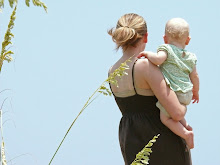Preface: We have only met one other couple, and they are also from California, who found themselves in a similar situation involving the NBS. I am not against the NBS, because I know it has saved lives, but there are days that I hate the NBS and it gets the blame of my stress and grieving.
In July of 2008, Sarah, our first and, so far, only child, was born. Within 8 hours of her birth, she was jaundice. We were able to take her home three days later. Two days after that (5 days after she was born), we took her to the pediatrician for her general newborn checkup and to see about her jaundice.
When the pediatrician inspected Sarah, he explained that Sarah seemed to be thriving and showed no evident signs that we should be worried. He, then, informed us that while we were in the waiting room, people from the state of California were on the phone and, in his words, yelling at the receptionist because they were unable to inform them of Sarah's status. He explained that Sarah's Newborn Screening flagged her as possibly having one of two metabolic disorders. He left us in the examination room while he contacted them again and went to get us all the information needed for the next step.
The pediatrician tried to find a lab that had experience drawing blood from a newborn. The next day, we got Sarah's blood drawn from her arm. It seemed like so much blood from such a small baby.
The metabolic clinic from our local children's hospital called and informed us that the blood tests were just barely elevated and these were often false/positives. To play it safe, they had us wake Sarah every three hours to feed and started her on carnitine three times a day.
During the time between her pediatrician's appointment and her metabolic appointment, we received some pamphlets in the mail. One of the pamphlets stated, "If a disease is not identified and treated quickly, mental retardation and other serious health problems can occur." This is true and was of no comfort as we waited for our appointment.
2 weeks and 6 days after Sarah's birth we had our first appointment with the metabolic clinic. Based on the 2nd blood test, they narrowed her possible disorder down to CPT II (carnitine palmitoyltransferase 2 deficiency). They did a heel prick blood test in the office and then about an hour after Sarah got more blood drawn at a lab. All of this was done after Sarah had been fasting and I hadn't given her carnitine since the night before about 13-15 hours prior to the blood draws. The heel prick test showed elevated levels and the test from the arm (done second) came back normal. All blood tests since have come back normal.
The doctor has said that the tests should be coming back normal because we are treating her. Her DNA showed no visible mutations and only one heterozygous polymorphism that is not known to cause CPT II. She has shown no physical symptoms of CPT II. At this point, there is apparently no test that will prove that she has or does not have CPT II. Herein lies our ethical quandary, we must play the odds.
Our choices now are:
- Treat Sarah like she has CPT II for fear of the possible chance that the Newborn Screening correctly identified her. The daily treatment of CPT II, compared to what others must deal with to care for their children with disorders, deficiencies, or even allergies, is nothing worthy of complaint. The part I dread is if Sarah gets an sickness/infection or refuses to eat for a certain amount of time, we must rush her to the hospital for IVs. I dread this because if Sarah doesn't have CPT II all of that is completely unnecessary.
- Treat Sarah as though she doesn't have CPT II, as though she were an average child with no need for medical intervention. We have decided that this choice actually has the possibility of more fear because of the harm that could incur because of not treating her. Some benefits if she really doesn't have CPT II, she can: sleep through the night, occasionally enjoy fatty treats (ice cream, avocado, birthday cake), not take carnitine, and not live the life of someone with a genetic disorder if she doesn't really need to.
In summary, the newborn screening may have been beneficial because we are treating Sarah like she has CPT II and, praise God, nothing bad has happened, or the newborn screening may have been the cause of a lot of unnecessary stress, doctors' appointments, and unneeded treatment. At this point, there is no way of knowing which is true. It is our prayer that we find evidence confirming or refuting whether Sarah has CPT II so we can live in that truth and enjoy the freedom involved in knowing.

No comments:
Post a Comment